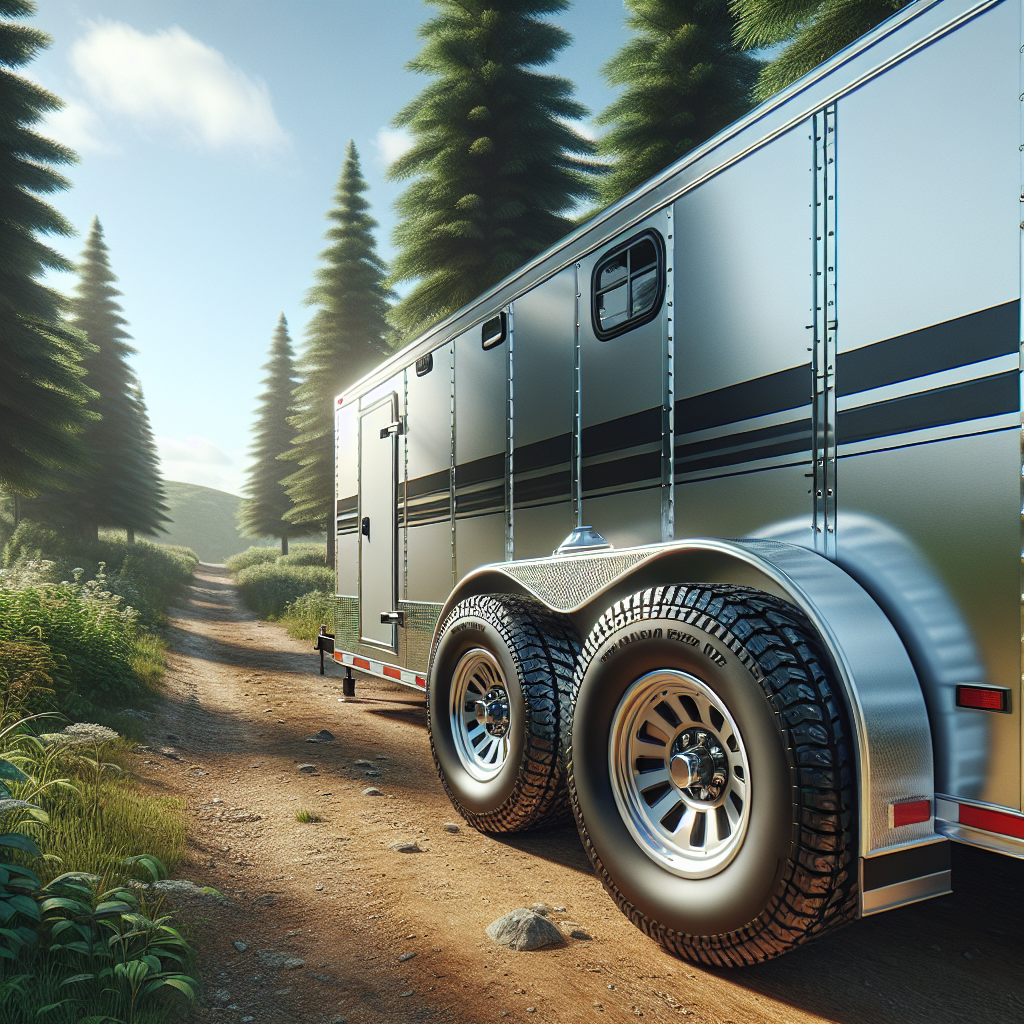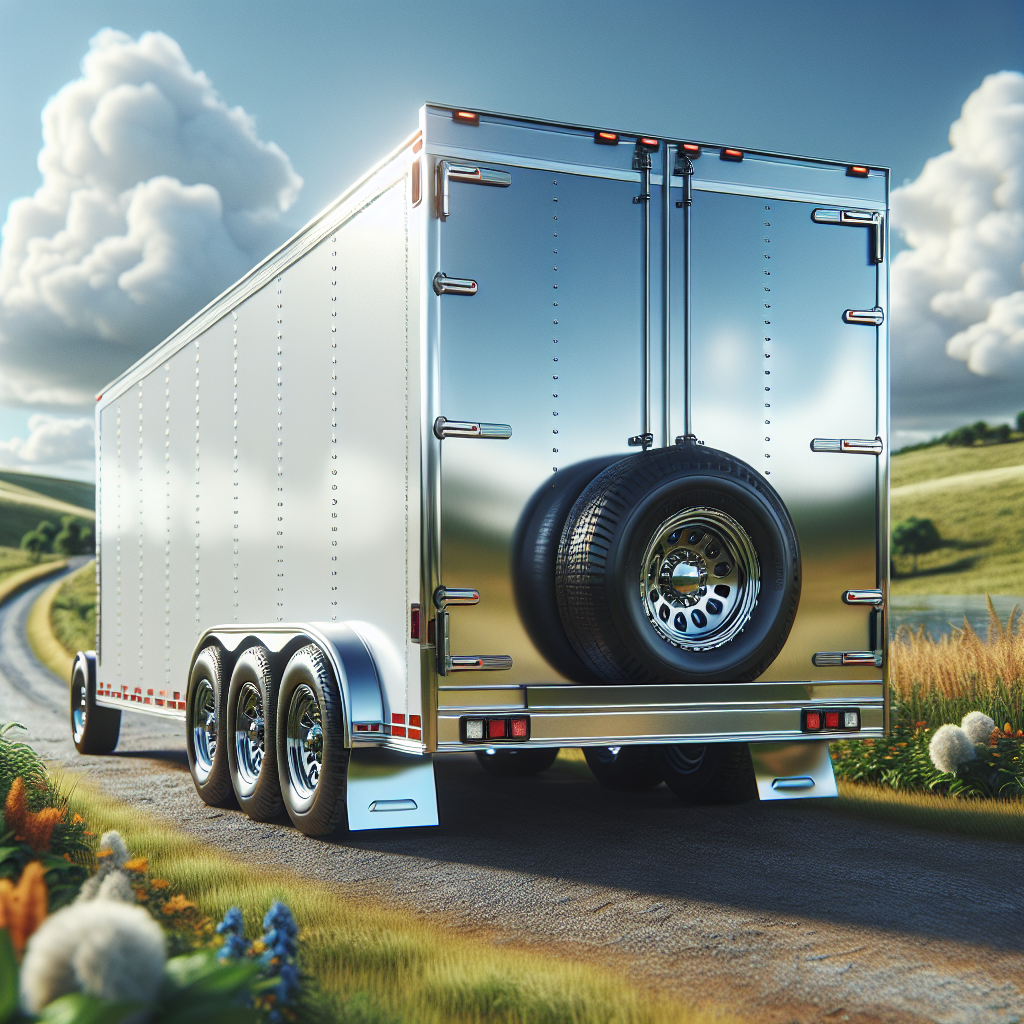Maintaining the right tire pressure is crucial for ensuring the safety and performance of your trailer. Incorrect tire pressure can lead to uneven wear, decreased fuel efficiency, and even tire blowouts, which can result in catastrophic events while towing.
The recommended tire pressure for trailer tires typically ranges between 50 to 80 PSI, depending on the specific make and model of the trailer. It's essential to check the owner's manual or the tire placard, usually located on the trailer's frame or tongue, for the manufacturer's specifications. Here are some tips to help you understand and maintain optimal tire pressure:
- Check Regularly: Tire pressure should be checked at least once a month and before long trips.
- Temperature Consideration: Tire pressure can fluctuate with temperature changes. For every 10°F change in temperature, tire pressure can change by approximately 1 PSI.
- Visual Inspections: Look for signs of wear or damage on the tires, as this can impact performance.
By understanding the importance of maintaining the correct tire pressure and following these guidelines, you can enhance the safety and longevity of your trailer tires. Tow with peace of mind, knowing that trailerwatchdog is standing guard.
Why Proper Tire Pressure Is Crucial For Trailers

Proper tire pressure is essential for trailers, impacting both safety and efficiency. When tires are inflated to their recommended pressure, they ensure optimal contact with the road, which is critical for stability, especially during towing. Here are some key reasons why maintaining proper tire pressure is crucial:
- Safety: Under-inflated tires can lead to blowouts or loss of control, particularly at high speeds or during turns. Proper inflation helps maintain traction and braking performance.
- Fuel Efficiency: Tires that are not inflated to the correct pressure can increase rolling resistance, causing the vehicle to consume more fuel. Keeping tires properly inflated can enhance fuel efficiency, saving you money in the long run.
- Tire Longevity: Tires that are consistently over or under-inflated wear unevenly and may need to be replaced sooner. Proper pressure can extend the lifespan of your tires, making your investment last longer.
- Load Capacity: Each tire has a maximum load capacity that it can safely carry when inflated to the correct pressure. Exceeding this capacity can lead to tire failure.
By ensuring your trailer tires are properly inflated, you safeguard not only your investment but also the safety of your vehicle and those sharing the road with you.
How To Check Tire Pressure On Your Trailer

Checking the tire pressure on your trailer is a straightforward process that should be performed regularly, especially before long trips. Here’s a step-by-step guide on how to accurately check tire pressure:
- Gather Your Tools: You will need a reliable tire pressure gauge, which can be digital or manual. Make sure it is calibrated for accurate readings.
- Check the Recommended Pressure: Before checking your tires, refer to the trailer’s owner manual or the placard located on the trailer frame. This will provide you with the recommended tire pressure for your specific trailer tires.
- Remove Valve Stem Caps: Start by removing the valve stem caps from each tire. Keep them in a safe place to avoid losing them.
- Press the Gauge: Firmly press the tire pressure gauge onto the valve stem. Ensure it is secure, allowing the gauge to provide an accurate reading. You may hear a hissing sound as air escapes; this is normal.
- Read the Pressure: Look at the gauge to see the pressure reading. Compare this number to the recommended pressure. If it is below the recommended level, your tire is under-inflated.
- Inflate If Necessary: If the tire pressure is low, use an air compressor to inflate the tire to the recommended level. Be sure to check periodically during inflation to avoid over-inflation.
- Replace Valve Stem Caps: After checking and adjusting the pressure, replace the valve stem caps securely to prevent dirt and moisture from entering the valve.
Regularly checking your trailer tire pressure is a simple yet effective way to maintain safety and performance while towing. Make this a part of your routine maintenance to ensure a smooth and safe journey.
Factors That Affect Trailer Tire Pressure

Understanding the various factors that affect tire pressure is crucial for maintaining the safety and efficiency of your trailer. Here are some key elements that can influence trailer tire pressure:
- Temperature Changes: Tire pressure can fluctuate significantly with temperature changes. Typically, for every 10°F change in ambient temperature, tire pressure can increase or decrease by about 1 PSI. Cold weather can lead to under-inflation, while hot weather can cause over-inflation.
- Load Weight: The weight being carried by the trailer directly impacts tire pressure. Heavier loads require higher tire pressure to ensure proper tire performance and prevent overheating. Always refer to the manufacturer’s guidelines for the recommended tire pressure based on the load.
- Driving Conditions: Roads that are rough or uneven can put additional stress on tires, leading to faster wear and potential changes in tire pressure. Frequent driving on such surfaces can result in a need for more regular pressure checks.
- Tire Age and Condition: As tires age, they can lose air more rapidly due to wear and tear. Inspecting your tires regularly for cracks, bulges, or other signs of deterioration is essential. Older tires may require more frequent pressure checks.
- Valve Stem Integrity: A damaged or faulty valve stem can lead to slow leaks in tire pressure. Regularly inspect valve stems for any signs of wear and replace them if necessary.
By being aware of these factors, trailer owners can take proactive steps to maintain optimal tire pressure, ensuring a safer towing experience.
Consequences Of Incorrect Tire Pressure On Trailers

Maintaining the correct tire pressure is not merely a matter of convenience; it is essential for the safety and performance of your trailer. Incorrect tire pressure can lead to several significant consequences:
- Tire Blowouts: One of the most serious risks associated with incorrect tire pressure is the potential for tire blowouts. Under-inflated tires can overheat due to excessive flexing, leading to catastrophic failures while on the road.
- Reduced Fuel Efficiency: Incorrect tire pressure can affect your vehicle's fuel efficiency. Under-inflated tires create more rolling resistance, which means your towing vehicle must work harder and consume more fuel.
- Uneven Tire Wear: Tires that are not inflated to the correct pressure will wear unevenly. This can lead to the need for premature tire replacements, increasing maintenance costs and affecting overall safety.
- Compromised Handling: Incorrect tire pressure can significantly affect the handling and stability of your trailer. Under-inflated tires can cause the trailer to sway, while over-inflated tires can lead to a harsh ride, making it difficult to control, especially in adverse weather conditions.
- Impact on Braking Performance: Tires that are not properly inflated can adversely affect braking distances. This is particularly critical when towing, as longer stopping distances can lead to accidents.
Regularly checking and maintaining the correct tire pressure is essential for safe and efficient trailer operation. Understanding these consequences can motivate trailer owners to prioritize tire maintenance.
Best Practices For Maintaining Trailer Tire Pressure
Maintaining optimal tire pressure is crucial for safe towing, and following best practices can help ensure your trailer remains road-ready. Here are some effective strategies for keeping your trailer tires in top condition:
- Regular Pressure Checks: Make it a habit to check your tire pressure at least once a month and before long trips. Use a reliable tire gauge to get accurate readings.
- Check When Cold: Always measure tire pressure when the tires are cold, as heat from driving can increase pressure readings and lead to inaccurate assessments.
- Follow Manufacturer Guidelines: Refer to the trailer manufacturer’s specifications for the recommended tire pressure. This information can usually be found on a sticker located on the trailer or in the owner’s manual.
- Inspect Tires for Damage: In addition to checking pressure, routinely inspect your tires for any signs of wear or damage, such as cracks, bulges, or foreign objects embedded in the tread.
- Rotate Tires Regularly: Just like with any vehicle, rotating your trailer tires can help promote even wear and prolong their lifespan. Check your owner's manual for recommended rotation intervals.
- Use a Tire Pressure Monitoring System (TPMS): Consider investing in a TPMS that provides real-time monitoring of tire pressure and alerts you to any significant changes, enhancing your ability to maintain optimal conditions.
By implementing these best practices, you can enhance your safety and performance while towing. Tow with peace of mind, knowing that TrailerWatchdog is standing guard. Visit us today!








